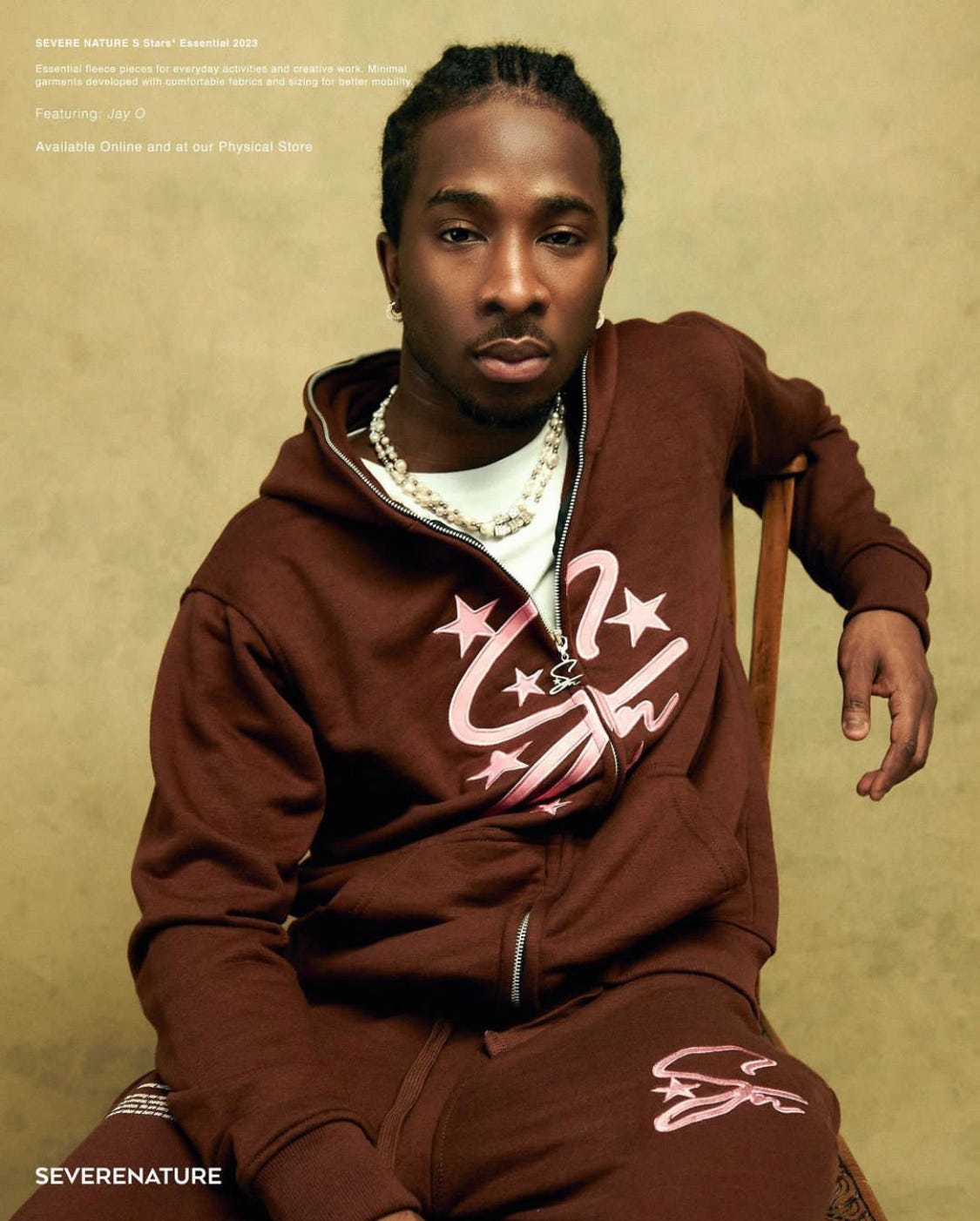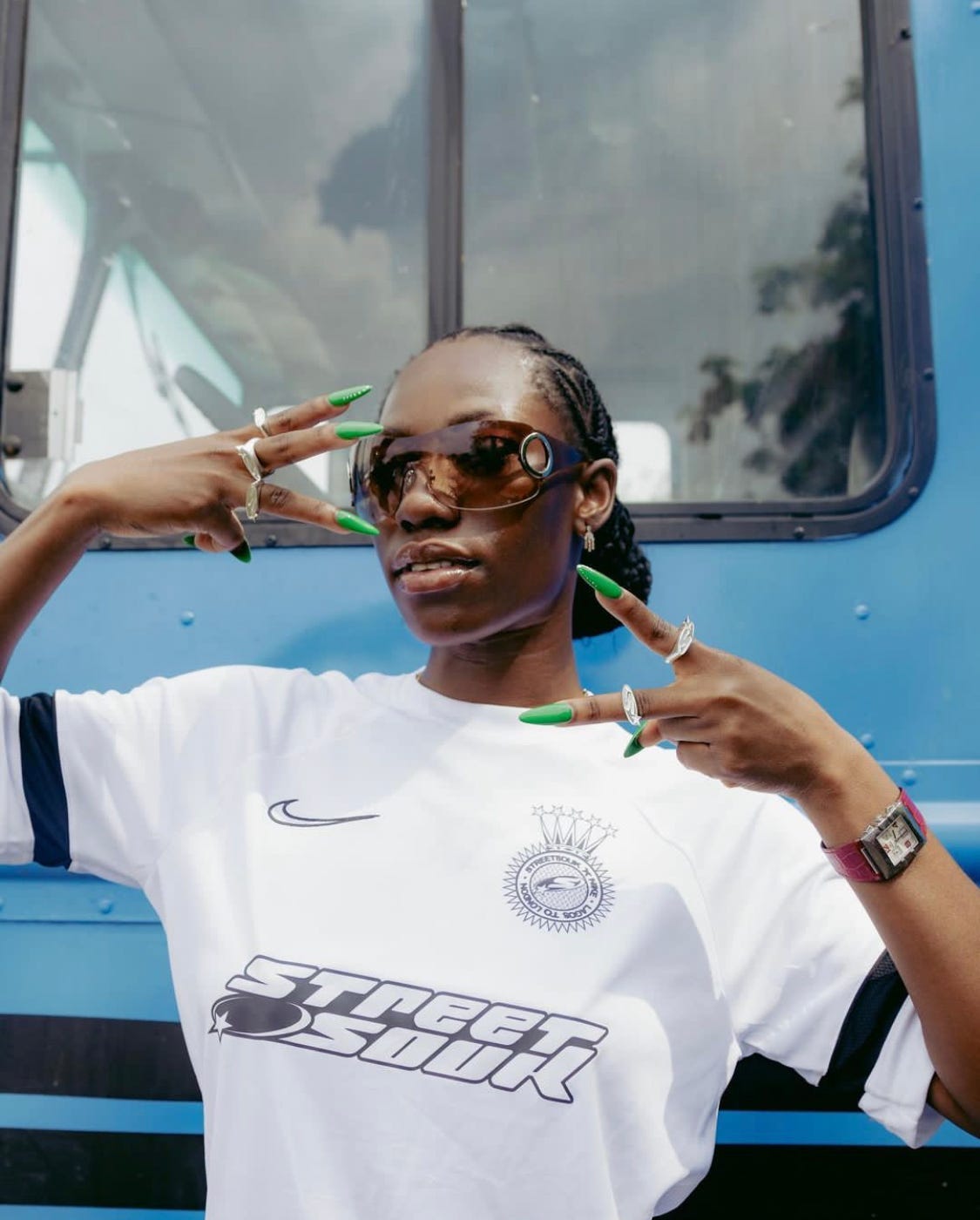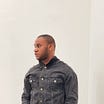Nigerian Streetwear Renaissance: Exploring the Flourishing Gen-Z and Millennial Style Expression
From Quintessential Elegance to Y2K Aesthetics: Unveiling the Meteoric Rise of Nigerian Streetwear Culture
There's no denying that the renaissance of the Nigerian streetwear industry has been meteoric. Within these Nigerian brands, we witness themes of pure elegance, a resurgence of Y2K aesthetics, and armored glamour, all of which offer quintessential style expressions for Nigerian Gen-Z and millennials. However, this flourishing emergence cannot solely be credited to Nigeria.
The streetwear culture can be traced back to the early '90s when trends like baggy jeans, tight nylon quilted vests, neoprene jackets, and platform heels gained popularity. With hip-hop stars like Jay-Z, Tupac Shakur, and Nas bringing this style into the spotlight, young millennials in New York and California embraced it. Now, almost 32 years later, the culture has become a global phenomenon, with Japanese street fashion going mainstream, skateboarding scenes flourishing in various countries, and music becoming even more phenomenal.
In Nigeria, the biggest consumers of streetwear fashion can be attributed to the alte subculture—a community of young Nigerians whose fashion style is unconventional and embraces experimental and non-gendered subversions. Think of stars like Ashley Okoli, Teezee, Lady Donli, and Odunsi the Engine. While the streetwear culture continues to thrive in this part of the world, fostering significant sartorial experimentation and promoting various genres and subcultures, it's crucial to recognize the designers who initiated this journey and are at the forefront of this movement. They have proven their worth by connecting communities through fashion. Here are five Nigerian street wear brands you need to know:
Meji Meji
Before Tolu Oye started her streetwear brand, Meji Meji, she was creating face mask and bucket hat combos for people in her college. She made the decision to overcome her fears and explore various creative avenues, which eventually led to the inception of Meji Meji. In Yoruba, 'Meji' means 'double,' a name Oye, who is deeply connected to her culture, derived from a Yoruba dictionary to align her vision with her roots. Based on this concept, Meji Meji was established to help individuals explore their heritage and take pride in their culture.
However, Meji Meji is not solely a cultural movement; the brand also emphasizes feminine expression through style. Their goal is to empower women to embrace their uniqueness and celebrate their beautiful essence. 'We take pride in offering quality and functionality, and we strive to style women who appreciate vibrant color palettes and bold cultural influences,' says Oye. 'While there has been a collective effort to increase representation of Black women in media, those who do not conform to the European standard of beauty often face exclusion. That's why we created Meji Meji Mama, our brand mascot, to symbolize women's empowerment.'
As an emerging designer, Tolu Oye faces various challenges, but she refuses to let them define her or her aspirations for Meji Meji. She expresses her gratitude to her high school fashion teacher, Mr. Gary Osborne, as well as inspiring designers like Sharmadean Reid and Priya Ahluwalia, who continue to influence her artistic journey. 'When discussing the streetwear industry, it's impossible not to mention the women pioneering the field, such as Grace Ladoja, owner of Metallic and Homecoming, and Ireti D, owner of Street Souk and WAF and Cream. Virgil Abloh has recognized the talent emerging from Nigeria. I believe that the streetwear industry in Nigeria is influencing the mainstream,' she says.
Sever Nature
When the brand Severe Nature is mentioned, the first thing that comes to mind is the extremity of self-expression. It's no wonder that one of the founders, Christopher Afolabi, describes the brand as 'the expression of youthful freedom.' Established in 2012 by Tobi Adeleye, Christopher Afolabi, and the late Michael Atobalele (Uzii), Severe Nature was created to fill a void in the Nigerian streetwear industry. 'We wanted to address an existing problem in the fashion industry,' says Afolabi. 'Growing up, whenever we wanted to purchase streetwear, we always had to look outside the country. There was nowhere to buy streetwear or access the streetwear culture in Nigeria. So, in 2016, we made it our mission to establish a fully Nigerian sector of the brand. We started with a pop-up in 2017, and the brand was very well received.'
The design aesthetic of Severe Nature is elusive, characterized by luxurious tailoring, bold fittings, and unconventional elegance—features that set it apart from other streetwear brands in the country. The brand operates with a modern essence while also embracing experimentation with redefined Y2K aesthetics, such as cropped tops and denim wear. It appeals to a diverse range of communities and generations, particularly millennials and Gen Z.
Street Souk
The first impression of Street Souk is that it represents the pinnacle of the Nigerian streetwear industry, making it a convention in its own right. The brand was founded in 2018 by Iretidayo Zacchaeus, whose passion for Nigerian streetwear culture fueled her vision for the industry's future potential. 'Street Souk is a celebration of African streetwear. My mission was to create a platform for both emerging and established streetwear brands in my city, bringing them closer to their target audience and fostering connections between brands in a physical space,' says Zaccheaus.
'Throughout my life, I've drawn inspiration from various individuals, including Grace Ladoja, Virgil Abloh, my ****brother Teezee, and my mother Yewande Zaccheaus, who had already started a fashion souk catering to an older demographic. She essentially provided me with the blueprint, and I adapted it to suit my own audience. I drew significant inspiration from events like Complex Con and Sole DXB, as their scale and significance affirmed the validity of my dream,' explains Zaccheaus.
However, as a young woman leading a brand that is prominent for being a streetwear convention in a male-dominated industry, Zaccheaus initially faced challenges. The significant age gap between herself and those she worked with posed difficulties. 'Nigeria is a country with an ageist mindset, and initially, it was tough for me to navigate a space where I could give instructions without encountering any resistance due to my age,' she tells Steelo magazine. While she has overcome these obstacles, she is most impressed by the brand's growth within the past four years.
For Asiafa Oghenefego and Asaju Samuel, the creative directors of David Blackmoore, creating a fashion brand that embodies a unique connection between personality and culture is revolutionary. Founded in 2015, David Blackmoore is a Nigerian streetwear brand that combines contemporary and traditional design aesthetics. The design duo aimed to redefine the narrative of fashion and sought to revolutionize the Nigerian streetwear industry by creating multidimensional, afro-futuristic clothing. 'We wanted to propel Nigerian streetwear culture and use fashion as a voice,' they tell Steelo magazine. 'Growing up in a third-world country like Nigeria, where most of our resources are exported and little emphasis is placed on locally produced goods, we believed we could be the change we wanted to see. We wanted to create a powerful brand that fully represents the Nigerian streetwear industry on the global market.'
In just seven years, David Blackmoore has released numerous collections, launched campaigns, built a substantial clientele at home and abroad, and styled celebrities such as Skepta and Burna Boy. In 2020, the brand caught the attention of the late fashion designer Virgil Abloh, who collaborated with them to create handcrafted denim for the Off-White x Street Souk campaign with the theme 'I Support Young Nigerian Women.' 'Moments like those kept us going and gave us strength to overcome challenges because if we could achieve it, any average African dreamer can do it too. We didn't attend fashion school or study abroad; David Blackmoore was born out of our deep desire to turn our dreams into reality,' they say.
The Nigerian Articulate Culture Kullection (N.A.C.K.) isn't just for Nigerians; the brand caters to an Afropolitan niche that extends not only to people born and raised in Africa but also to Africans in the diaspora. Founded in 2006 by Tolulope Akinpeloye, N.A.C.K. was created to address a complex issue of identity. Akinpeloye believed that discussing cultural backgrounds didn't foster unity. Therefore, through fashion, he aimed to create a tribe of individuals with a unified identity. 'I wanted to establish a space where people could proudly say, 'I'm African,' and that would be all that mattered,' Akinpeloye tells Steelo magazine.
N.A.C.K. operates with a Nigerian sensibility, blending modern and traditional elements to convey a sense of fluidity in its style. In nearly 16 years of existence, the brand has achieved significant success, expanding its audience beyond young people to include children and middle-aged individuals. With stores in various parts of the country, N.A.C.K. has found solutions to the challenges it initially set out to overcome. However, the brand's biggest obstacle remains its geographical location. 'Running a business in Nigeria is hard,' says Akinpeloye. 'I would describe it as Nigeria-lysis; it's a disease that affects every business owner, from government policies to insecurity and limited access to funds. These factors have directly or indirectly posed challenges for us too.'
Nevertheless, Tolulope Akinpeloye firmly believes that the brand's vision holds a future that has always existed—to become the most preferred Afropolitan brand in Africa.
In conclusion, the Nigerian streetwear industry has experienced a remarkable rave , propelled by themes of elegance, Y2K aesthetic resurgence, and armored glamour. While the origins of streetwear culture can be traced back to international influences, Nigerian brands have infused their unique style expressions, catering to the Gen-Z and millennial demographic. Through sartorial experimentation, these designers have not only celebrated their cultural roots but also connected communities and fostered subcultures. With brands like Meji Meji, Severe Nature, Street Souk, David Blackmoore, and N.A.C.K. leading the forefront, the Nigerian streetwear scene continues to influence the global fashion landscape. As we celebrate their achievements, let us embrace the vibrancy, creativity, and empowerment these brands bring, defining a new era of Nigerian streetwear.











I first met Sarah at St. James Episcopal Church in Los Angeles during a Sunday service. We struck up a conversation, and over time, we became friends, sharing stories about our lives and our work. Sarah, a seasoned journalist, has always been passionate about telling the truth, unraveling complex issues, and holding those in power accountable. However, she never expected that her trust in the digital world would lead her to become a victim of a well-organized scam.It all started when Sarah received an email that appeared to be from a reputable media subscription service. The email promised access to exclusive industry insights and breaking news stories for a small monthly fee. As a journalist, she recognized the value of staying ahead of the curve with the latest information, and so, she signed up for what she believed was a legitimate service. What she didn’t realize was that the entire operation was a scam designed to prey on professionals like her.The scam website looked remarkably legitimate, with polished graphics and professional language. Sarah was asked to provide payment upfront, and she paid $11,000 for what she thought was a comprehensive subscription package. Within a few days, however, the website disappeared, and Sarah was locked out of her account. Emails went unanswered, and the phone numbers listed on the website were disconnected.Devastated and unsure of where to turn, Sarah shared her ordeal with me. She had lost a significant amount of money, and the situation felt hopeless. But that's when I suggested she contact Blockchain Cyber Retrieve, a firm specializing in recovering funds lost to online scams. Sarah took my advice and reached out to the team at Blockchain Cyber Retrieve, hoping they could help her retrieve her hard-earned money. To her relief, Blockchain Cyber Retrieve acted quickly and efficiently. After conducting a thorough investigation, they were able to trace the funds and successfully recover the full $11,000 that Sarah had lost to the scam. Sarah was incredibly grateful to get all of her money back, and she felt a renewed sense of trust in recovery services.This experience left a lasting impact on her, and she now shares her story with fellow journalists and media professionals, warning them of the dangers of falling for scams in the digital age. Sarah’s story serves as a crucial reminder for all of us to remain vigilant, especially in an age where technology has made it easier for scammers to exploit our trust. If you find yourself in such situations dont hesitate to reach out to Blockchain Cyber Retrieve via:
WhatsApp: .+ 1 52 0 564 8300
EmaiL: blockchaincyberretrieve @ post {.} c o m support@ blockchaincyberretrieve.org